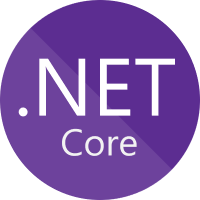18
Apr.NET Developer Should Learn Azure or AWS?
Azure or AWS for a .NET Developer?: An Overview
Cloud technologies have revolutionized how applications are built, deployed, and managed. .NET is a free, cross-platform, and open-source programming framework that enables the development of various web, mobile, and cloud computing applications. For .NET developers, embracing cloud computing opens up a world of possibilities, enabling scalable, flexible, and cost-effective solutions.
Azure and AWS are two popular cloud platforms having wide usage. The choice between Azure and AWS depends on specific requirements, technology familiarity, integration with existing systems, and cost considerations. Organizations often evaluate both platforms to determine the best fit for their needs. In this .NET tutorial, we will look into the details of both certifications from the perspective of a .NET developer.
Cloud Computing Service Models
Cloud computing means storing and accessing data and programs over the Internet instead of our local computer's hard drive.
In traditional hosting, a software company has to deal with licensing costs, protection of data, frequent upgrades to the latest technologies, maintenance and up gradation of hardware, and most importantly finding the right skill at the right time.
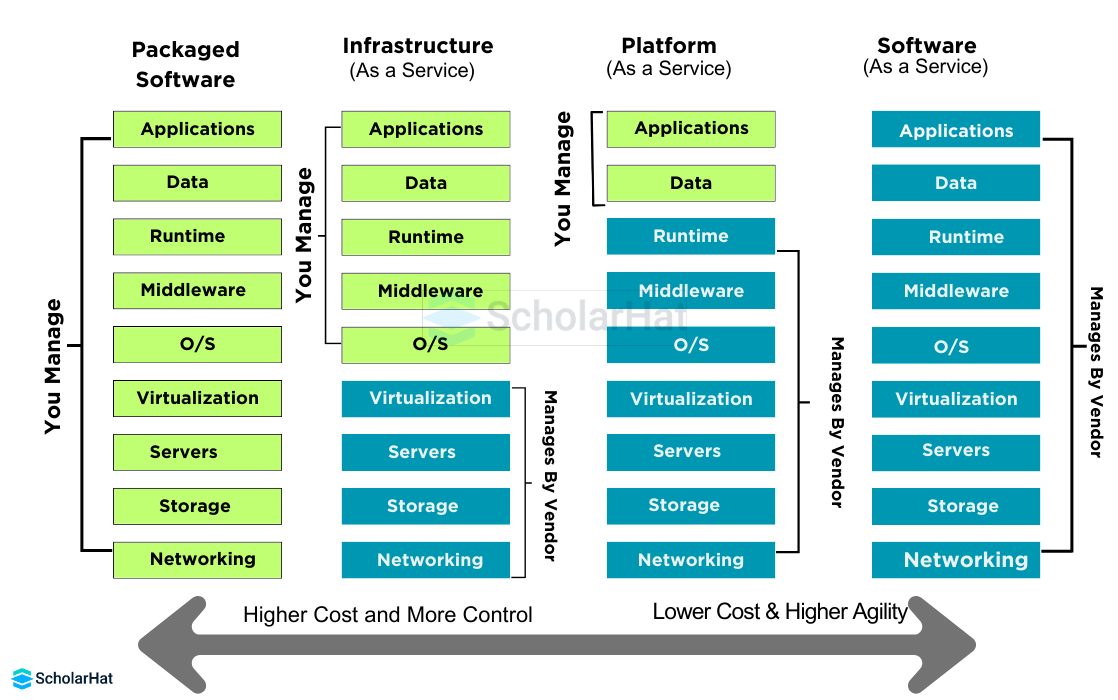
Read More - Advanced .Net Interview Questions
Azure Vs AWS
AWS and Azure both are popular cloud service platforms that offer SaaS, PaaS, and IaaS with high reliability, scalability, and low-cost infrastructure. The choice of AWS and Azure is motivated by the fact that AWS is a clear leading Cloud vendor while Azure is the fastest-growing cloud provider. It is important to consider them from an operational perspective.
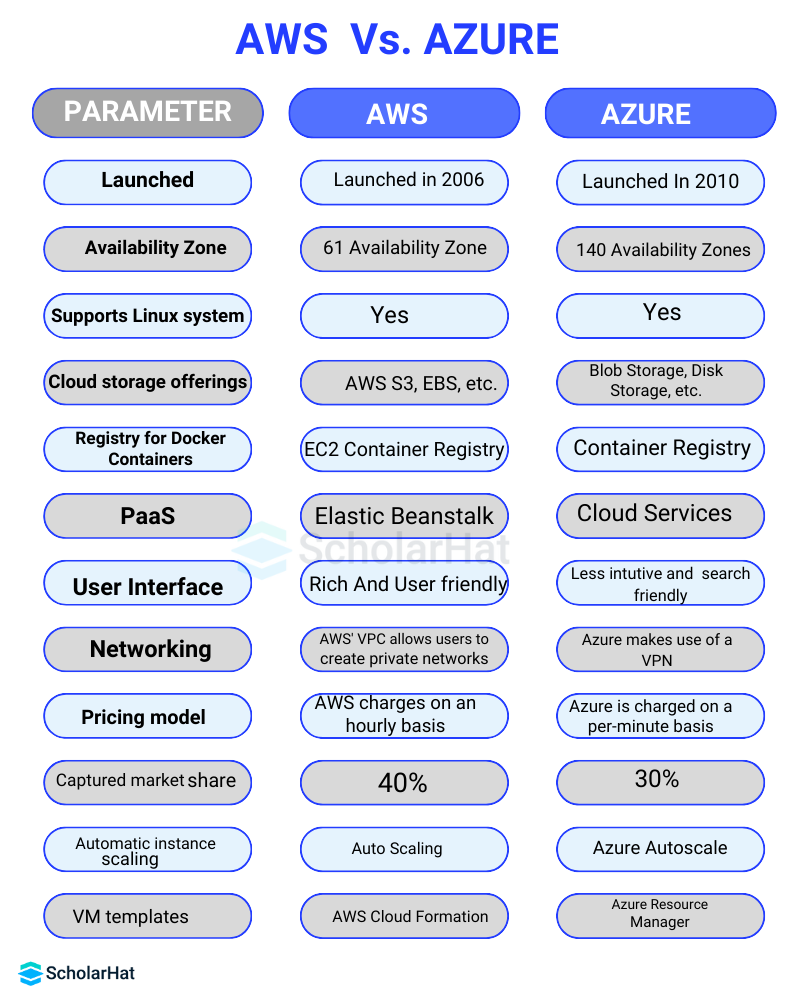
AWS Certification
AWS (Amazon Web Services) offers a range of certifications designed to validate technical expertise in cloud computing and AWS services. These certifications cater to various roles and proficiency levels, providing individuals with opportunities to demonstrate their skills and knowledge in AWS technologies. The certifications are available in multiple languages and can be taken through Pearson VUE or Prometric testing centers.
.NET and AWS
.NET developers can make applications faster using .NET on AWS. It has a service for every job, so you can quickly build proofs of concept without worrying about managing infrastructure. With the release of .NET 8, AWS services and tools have either been updated or are being updated, to provide .NET 8 support.
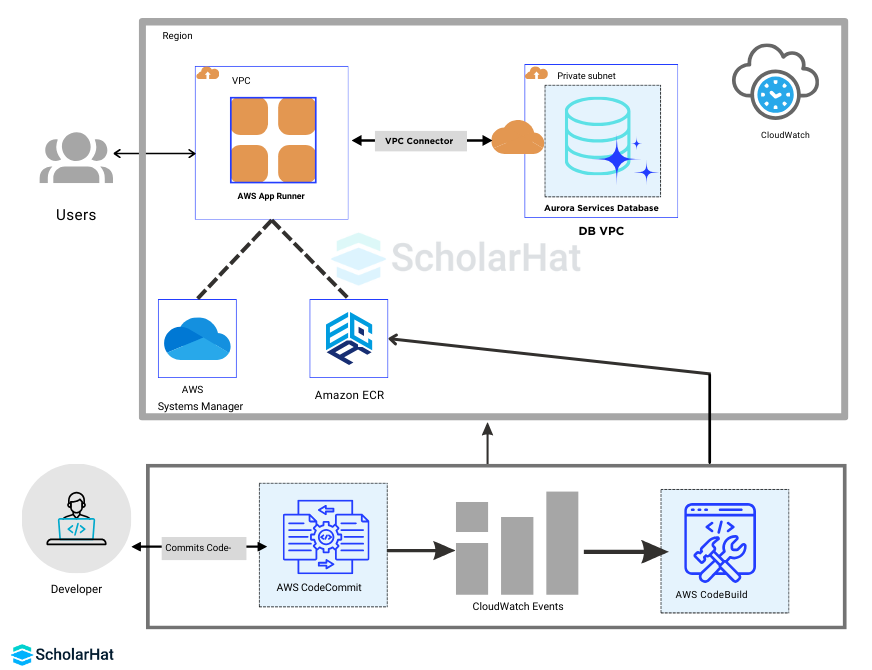
Compute Services
- AWS Elastic Beanstalk handles application deployment and operational tasks.
- Amazon EC2 provides secure and resizable computing capacity in the cloud.
- Amazon Aurora automates database administration.
- AWS Lambda supports .NET Core, allowing developers to write Lambda functions using C# and .NET Core runtime.
Tools, Libraries, and SDK
- AWS SDK for .NET makes it easier for Linux and Windows developers to build .NET applications.
- AWS Code Build helps developers automatically build applications from source code.
- AWS Deploy Tool for .NET command line interface (CLI) is an interactive assistant that provides compute recommendations for .NET applications and deploys them to AWS in a few easy steps
- AWS Toolkit for Visual Studio is an extension for Microsoft Visual Studio running on Microsoft Windows that makes it easier for developers to develop, debug, and deploy .NET applications using Amazon Web Services.
.NET Modernization Tools
- AWS App2Container (A2C) is a command line tool that containerizes your applications.
- AWS Microservice Extractor for .NET simplifies the process of re-architecting older monolithic applications into smaller code projects to build a microservices-based architecture.
ScholarHat offers you the following course to learn the AWS technology.
Azure Certification
Azure certifications validate technical expertise in Microsoft Azure cloud services and solutions, demonstrating proficiency in various Azure roles and job functions. Microsoft offers a range of certifications tailored to different skill levels and job roles within the Azure ecosystem. The Azure certification is the best choice for .NET developers, as it’s more suitable for companies that use Microsoft technologies and cloud computing. It is recommended for those already working with .NET developers or are interested in pursuing careers in cloud computing.
.NET and Azure
.NET and Azure both are Microsoft's products and hence complement each other seamlessly, offering a powerful combination for building, deploying, and managing modern cloud-based applications. Azure empowers .NET developers to harness the full potential of cloud computing, accelerate application development, improve scalability, enhance security, and drive innovation in today's digital landscape.
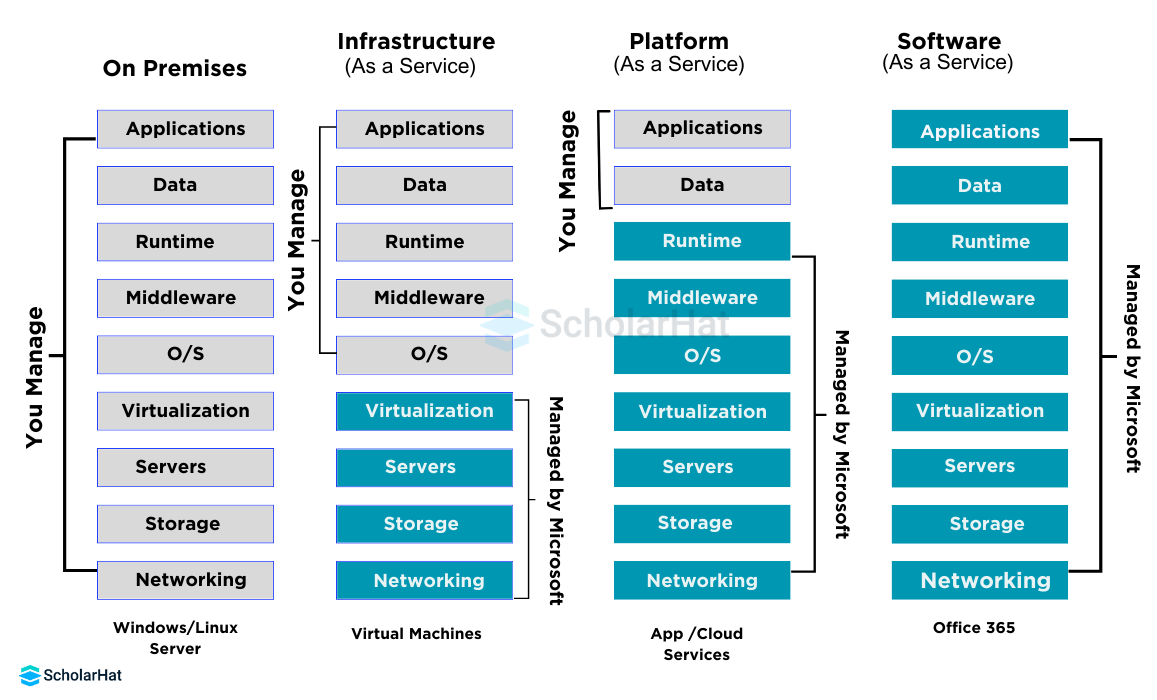
Application development scenarios on Azure
- Application hosting on Azure - Azure can host your entire application stack from web applications and APIs to databases to storage services. Azure supports a variety of hosting models from fully managed services to containers to virtual machines.
- Consuming cloud services from applications - Existing apps can incorporate Azure services to extend their capabilities. This could include adding full-text searching capability with Azure Cognitive Search, securely storing application secrets in Azure Key Vault, or adding vision, speech, and language understanding capabilities with Azure Cognitive Services.
- Modern serverless architectures - Azure Functions simplify building solutions to handle event-driven workflows, whether responding to HTTP requests, handling file uploads in Blob storage, or processing events in a queue. You write only the code necessary to handle your event without worrying about servers or framework code. There are also 250+ connectors to other Azure and third-party services for resolving integration problems.
Cloud Applications in .NET using Azure
- Infrastructure as a Service (IaaS): Visual Studio 2019 has built-in support for publishing ASP.NET and ASP.NET Core-based web applications to Azure Virtual Machines running Windows. The feature uses the Web Deploy tool to deploy the application to the IIS (Internet Information Services) web server on the selected virtual machine.
To have more control over the deployment, it should be done from our build server as part of the CI/CD (continuous integration and continuous deployment) process. Microsoft’s build server in the cloud is named Azure Pipelines and it’s a part of Azure DevOps.
- Platform as a Service (PaaS): Instead of having to manage the virtual machine, we only interact with the web server software which is exposed as a cloud service. In Azure, the service is called Azure App Service Web Apps. An ASP.NET or ASP.NET Core web application can be easily deployed to the Azure App Service Web App instance using Visual Studio 2019.
- Serverless Computing: In Azure, there are two serverless services available. Azure Container Instances is a serverless hosting model for Docker containers. The second serverless service is Azure Functions. This one is quite similar to Azure App Service Web Apps.
ScholarHat offers you the following courses and training to learn the Azure technology.
- Azure Certification Training | AZ-104: Azure Administrator Associate
- Azure Developer Certification (Az-204) Training
- Azure DevOps Certification Training
- Azure Solution Architect Certification Training
- Microsoft Azure Cloud Architect
- Azure Developer Certification Course (Az-204)
- Free Azure Fundamentals Course
Why Azure is a better choice for .NET Developers?
1. Native Integration
- .NET Support: Azure provides first-class support for .NET applications, frameworks, and development tools. .NET developers can leverage their existing skills and knowledge to build cloud-native applications on Azure.
2. Development Tools
- Visual Studio Integration: This Microsoft's integrated development environment (IDE), offers built-in support for Azure development. Developers can use Visual Studio to create, debug, and deploy .NET applications directly to Azure.
3. Azure Services for .NET
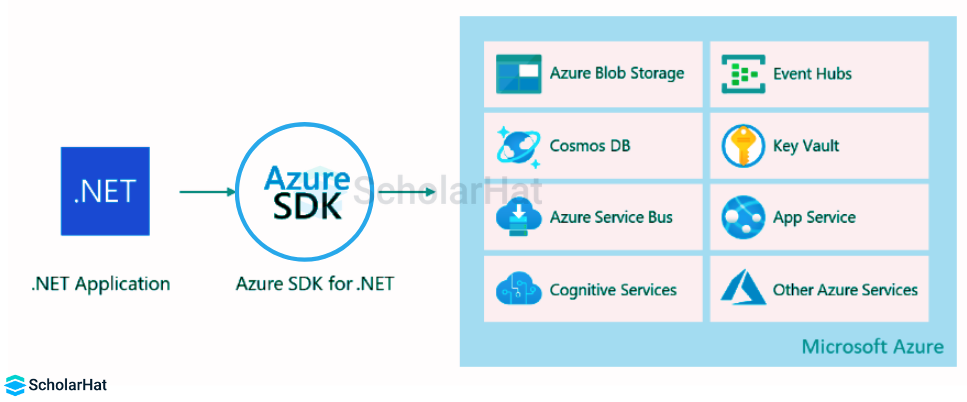
- Azure App Service: Allows developers to deploy and host web applications, APIs, and microservices written in .NET.
- Azure Functions: Provides serverless compute capabilities, allowing developers to run event-driven code written in .NET without managing infrastructure.
- Azure SQL Database: Offers managed SQL database services optimized for .NET applications, providing scalability, high availability, and security features.
- Azure Storage: Provides scalable storage solutions for .NET applications, including Blob storage, Table storage, Queue storage, and File storage.
4. DevOps Integration
- Azure DevOps: Azure DevOps provides a set of tools for source control, continuous integration (CI), continuous deployment (CD), and release management. .NET developers can use Azure DevOps pipelines to automate build and deployment processes for their applications.
5. Identity and Access Management
- Azure Active Directory (AAD): AAD offers identity and access management services for .NET applications, enabling single sign-on (SSO), multi-factor authentication (MFA), role-based access control (RBAC), and secure access to Azure resources.
6. Monitoring and Logging
- Azure Monitor: Azure Monitor provides monitoring and logging services for .NET applications running on Azure. Developers can monitor performance metrics, diagnose issues, and gain insights into application behavior using Azure Monitor.
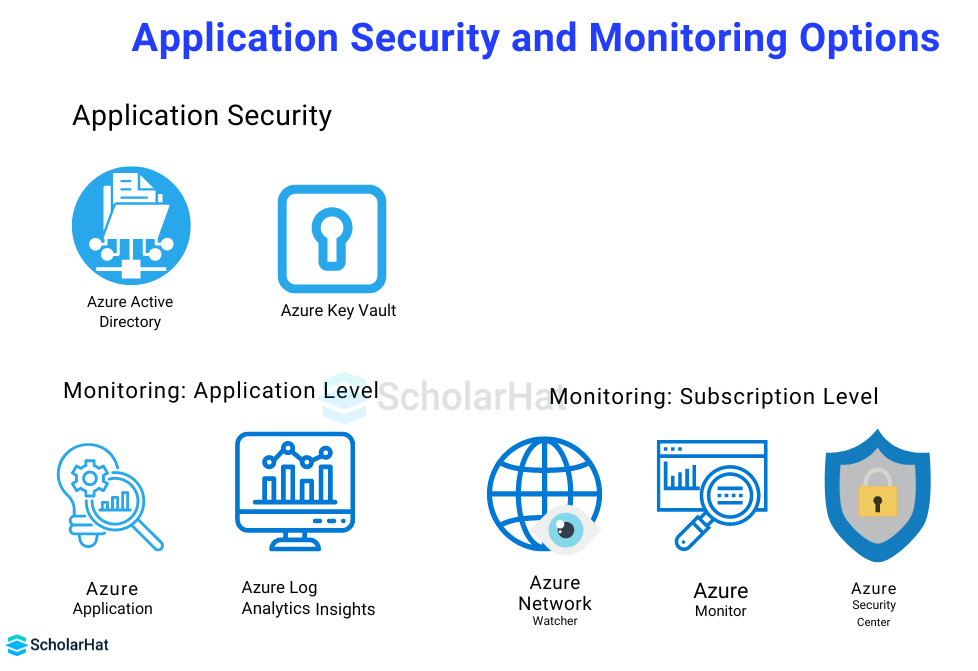
7. Machine Learning and AI
- Azure AI: Azure offers AI and machine learning services, including Azure Machine Learning, Azure Cognitive Services, and Azure Bot Service. .NET developers can integrate these services into their applications to add intelligence and natural language processing capabilities.
8. Data Analytics
- Azure Data Services: Azure provides a comprehensive suite of data analytics services, including Azure Data Lake, Azure Synapse Analytics, Azure Databricks, and Azure HDInsight. .NET developers can leverage these services to analyze, process, and visualize large volumes of data.
9. Hybrid Solutions
- Azure Hybrid Solutions: Azure supports hybrid cloud scenarios, allowing .NET applications to seamlessly integrate with on-premises infrastructure. Developers can build hybrid solutions using Azure Stack, Azure Arc, and hybrid networking capabilities.
10. Scalability and Reliability
- Elastic Scalability: Azure offers elastic scalability, allowing .NET applications to scale up or down based on demand. Developers can leverage Azure's global infrastructure and redundancy features to ensure high availability and reliability for their applications.
Summary
Here, as per our discussion, we can conclude that Azure is a better choice for .NET developers. Both belong to Microsoft so there are minimal compatibility issues between them. If you want to build a progressive career in .NET technology, you can learn both, Azure and AWS and implement them in building cloud computing applications. But, if you want to choose between Azure and AWS, we suggest you go for Azure. It is more than sufficient for a successful career and a learned experience.
FAQs
- Azure App Service for hosting web applications
- Azure Functions for serverless computing
- Azure SQL Database for managed relational databases
- Azure Storage for scalable storage solutions
- Azure DevOps for CI/CD pipelines
- Amazon EC2 for virtual servers
- AWS Lambda for serverless computing
- Amazon RDS for managed relational databases
- Amazon S3 for scalable object storage
- AWS Elastic Beanstalk for deploying web applications






